Analyzing the Role of Law in Singapore's Social Change
VerifiedAdded on 2023/01/10
|15
|4981
|1
Report
AI Summary
This report provides an in-depth analysis of the role of law in Singapore's economic, political, and social development. It begins with an introduction to Singapore's legal framework, which is based on the common law of England, and emphasizes the significance of law in national development. The report is divided into two main parts. The first part explores the interplay between politics, economics, and law in Singapore's development. The second part delves into the civil law style legal reforms implemented in Singapore and their impact on the country's progress. The report traces the evolution of Singapore's legal system from its British colonial past to its current state, highlighting key milestones and legal reforms. It also examines the impact of these legal changes on Singapore's economic success and social transformation, emphasizing the importance of aligning the legal system with global standards. The report includes detailed information about the legal system and its impact on the country's development.

Analysis of the role of law in the process of economic political or social development by
focusing on a particular aspect of social change in Singapore
focusing on a particular aspect of social change in Singapore
Paraphrase This Document
Need a fresh take? Get an instant paraphrase of this document with our AI Paraphraser

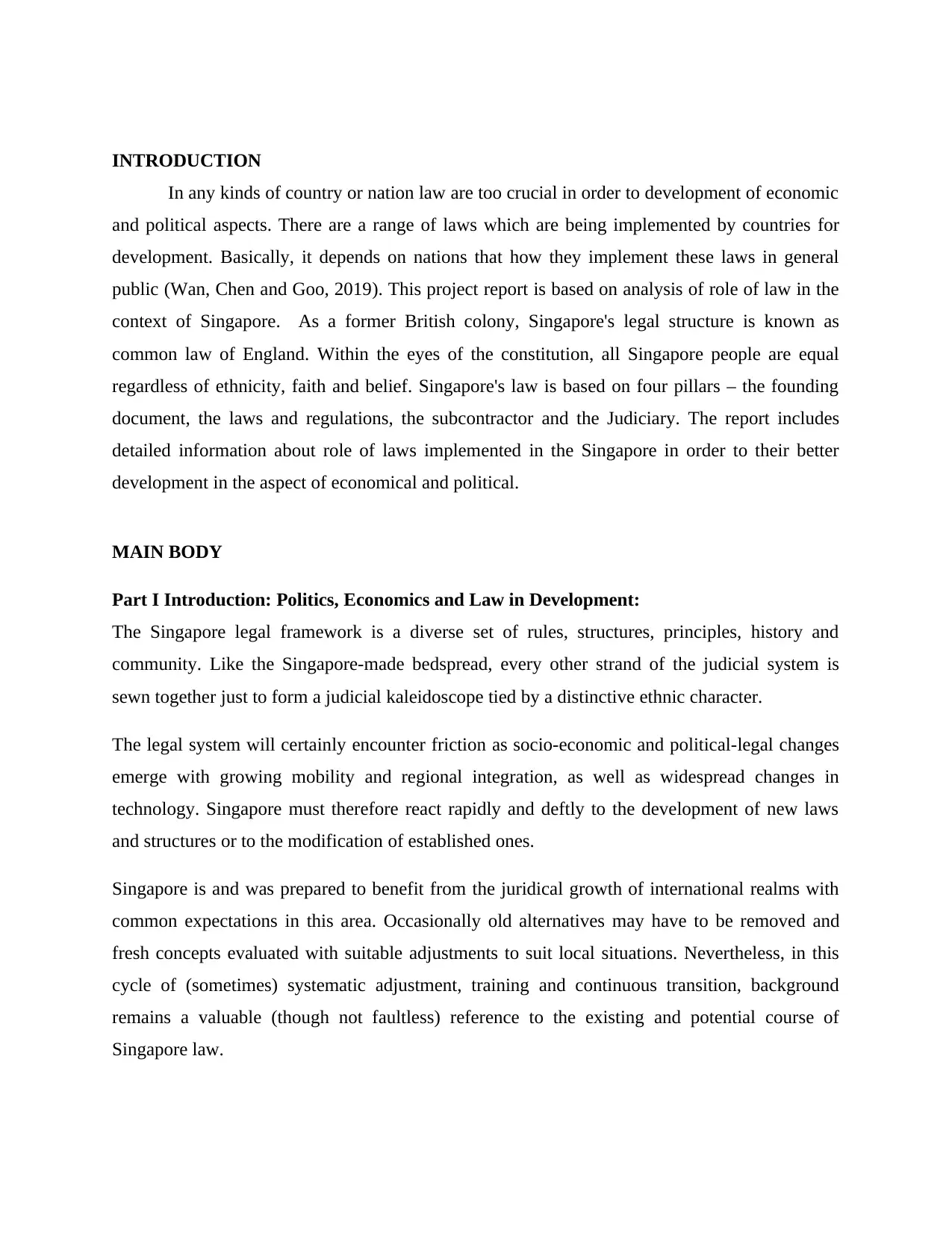
INTRODUCTION
In any kinds of country or nation law are too crucial in order to development of economic
and political aspects. There are a range of laws which are being implemented by countries for
development. Basically, it depends on nations that how they implement these laws in general
public (Wan, Chen and Goo, 2019). This project report is based on analysis of role of law in the
context of Singapore. As a former British colony, Singapore's legal structure is known as
common law of England. Within the eyes of the constitution, all Singapore people are equal
regardless of ethnicity, faith and belief. Singapore's law is based on four pillars – the founding
document, the laws and regulations, the subcontractor and the Judiciary. The report includes
detailed information about role of laws implemented in the Singapore in order to their better
development in the aspect of economical and political.
MAIN BODY
Part I Introduction: Politics, Economics and Law in Development:
The Singapore legal framework is a diverse set of rules, structures, principles, history and
community. Like the Singapore-made bedspread, every other strand of the judicial system is
sewn together just to form a judicial kaleidoscope tied by a distinctive ethnic character.
The legal system will certainly encounter friction as socio-economic and political-legal changes
emerge with growing mobility and regional integration, as well as widespread changes in
technology. Singapore must therefore react rapidly and deftly to the development of new laws
and structures or to the modification of established ones.
Singapore is and was prepared to benefit from the juridical growth of international realms with
common expectations in this area. Occasionally old alternatives may have to be removed and
fresh concepts evaluated with suitable adjustments to suit local situations. Nevertheless, in this
cycle of (sometimes) systematic adjustment, training and continuous transition, background
remains a valuable (though not faultless) reference to the existing and potential course of
Singapore law.
In any kinds of country or nation law are too crucial in order to development of economic
and political aspects. There are a range of laws which are being implemented by countries for
development. Basically, it depends on nations that how they implement these laws in general
public (Wan, Chen and Goo, 2019). This project report is based on analysis of role of law in the
context of Singapore. As a former British colony, Singapore's legal structure is known as
common law of England. Within the eyes of the constitution, all Singapore people are equal
regardless of ethnicity, faith and belief. Singapore's law is based on four pillars – the founding
document, the laws and regulations, the subcontractor and the Judiciary. The report includes
detailed information about role of laws implemented in the Singapore in order to their better
development in the aspect of economical and political.
MAIN BODY
Part I Introduction: Politics, Economics and Law in Development:
The Singapore legal framework is a diverse set of rules, structures, principles, history and
community. Like the Singapore-made bedspread, every other strand of the judicial system is
sewn together just to form a judicial kaleidoscope tied by a distinctive ethnic character.
The legal system will certainly encounter friction as socio-economic and political-legal changes
emerge with growing mobility and regional integration, as well as widespread changes in
technology. Singapore must therefore react rapidly and deftly to the development of new laws
and structures or to the modification of established ones.
Singapore is and was prepared to benefit from the juridical growth of international realms with
common expectations in this area. Occasionally old alternatives may have to be removed and
fresh concepts evaluated with suitable adjustments to suit local situations. Nevertheless, in this
cycle of (sometimes) systematic adjustment, training and continuous transition, background
remains a valuable (though not faultless) reference to the existing and potential course of
Singapore law.
⊘ This is a preview!⊘
Do you want full access?
Subscribe today to unlock all pages.

Trusted by 1+ million students worldwide
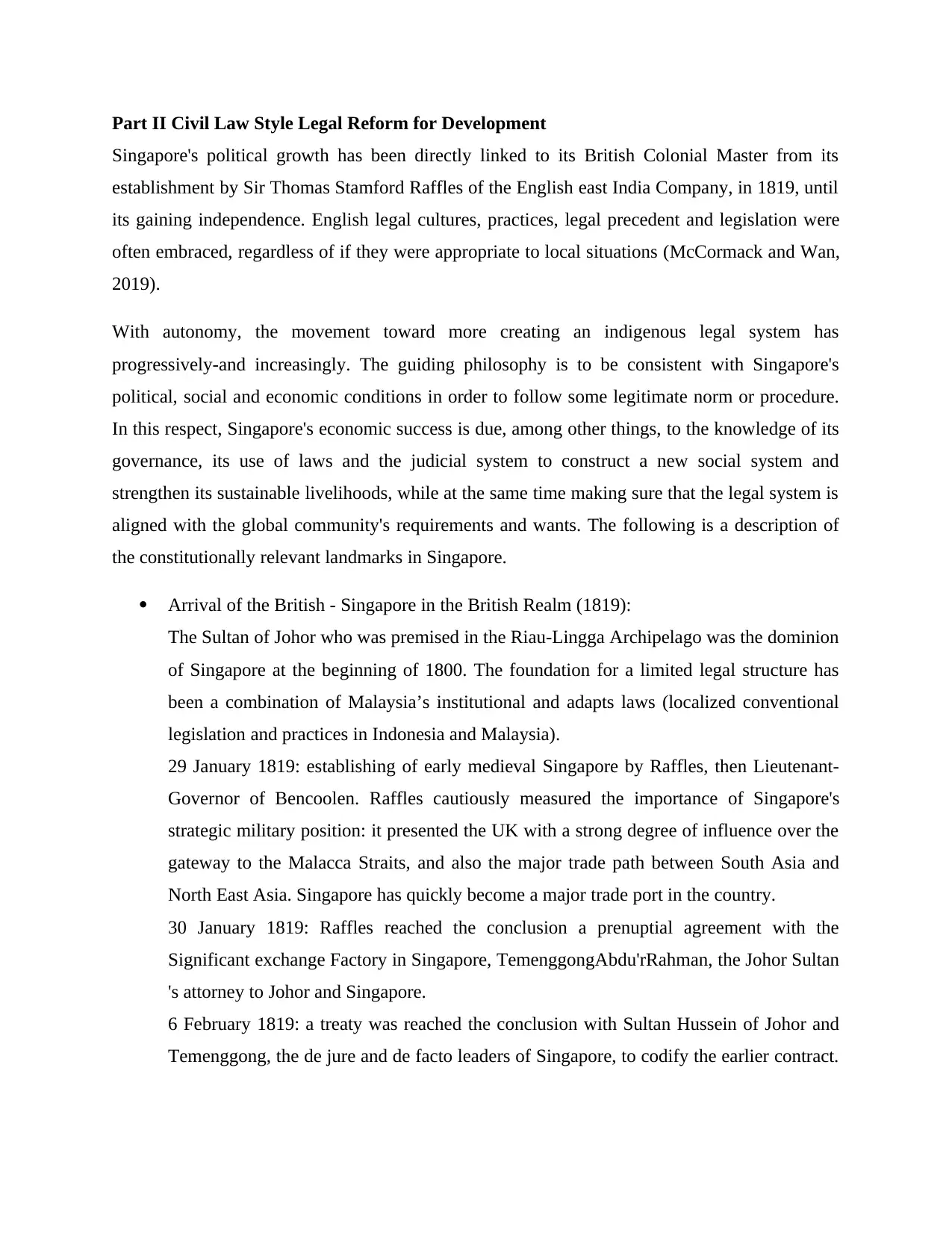
Part II Civil Law Style Legal Reform for Development
Singapore's political growth has been directly linked to its British Colonial Master from its
establishment by Sir Thomas Stamford Raffles of the English east India Company, in 1819, until
its gaining independence. English legal cultures, practices, legal precedent and legislation were
often embraced, regardless of if they were appropriate to local situations (McCormack and Wan,
2019).
With autonomy, the movement toward more creating an indigenous legal system has
progressively-and increasingly. The guiding philosophy is to be consistent with Singapore's
political, social and economic conditions in order to follow some legitimate norm or procedure.
In this respect, Singapore's economic success is due, among other things, to the knowledge of its
governance, its use of laws and the judicial system to construct a new social system and
strengthen its sustainable livelihoods, while at the same time making sure that the legal system is
aligned with the global community's requirements and wants. The following is a description of
the constitutionally relevant landmarks in Singapore.
Arrival of the British - Singapore in the British Realm (1819):
The Sultan of Johor who was premised in the Riau-Lingga Archipelago was the dominion
of Singapore at the beginning of 1800. The foundation for a limited legal structure has
been a combination of Malaysia’s institutional and adapts laws (localized conventional
legislation and practices in Indonesia and Malaysia).
29 January 1819: establishing of early medieval Singapore by Raffles, then Lieutenant-
Governor of Bencoolen. Raffles cautiously measured the importance of Singapore's
strategic military position: it presented the UK with a strong degree of influence over the
gateway to the Malacca Straits, and also the major trade path between South Asia and
North East Asia. Singapore has quickly become a major trade port in the country.
30 January 1819: Raffles reached the conclusion a prenuptial agreement with the
Significant exchange Factory in Singapore, TemenggongAbdu'rRahman, the Johor Sultan
's attorney to Johor and Singapore.
6 February 1819: a treaty was reached the conclusion with Sultan Hussein of Johor and
Temenggong, the de jure and de facto leaders of Singapore, to codify the earlier contract.
Singapore's political growth has been directly linked to its British Colonial Master from its
establishment by Sir Thomas Stamford Raffles of the English east India Company, in 1819, until
its gaining independence. English legal cultures, practices, legal precedent and legislation were
often embraced, regardless of if they were appropriate to local situations (McCormack and Wan,
2019).
With autonomy, the movement toward more creating an indigenous legal system has
progressively-and increasingly. The guiding philosophy is to be consistent with Singapore's
political, social and economic conditions in order to follow some legitimate norm or procedure.
In this respect, Singapore's economic success is due, among other things, to the knowledge of its
governance, its use of laws and the judicial system to construct a new social system and
strengthen its sustainable livelihoods, while at the same time making sure that the legal system is
aligned with the global community's requirements and wants. The following is a description of
the constitutionally relevant landmarks in Singapore.
Arrival of the British - Singapore in the British Realm (1819):
The Sultan of Johor who was premised in the Riau-Lingga Archipelago was the dominion
of Singapore at the beginning of 1800. The foundation for a limited legal structure has
been a combination of Malaysia’s institutional and adapts laws (localized conventional
legislation and practices in Indonesia and Malaysia).
29 January 1819: establishing of early medieval Singapore by Raffles, then Lieutenant-
Governor of Bencoolen. Raffles cautiously measured the importance of Singapore's
strategic military position: it presented the UK with a strong degree of influence over the
gateway to the Malacca Straits, and also the major trade path between South Asia and
North East Asia. Singapore has quickly become a major trade port in the country.
30 January 1819: Raffles reached the conclusion a prenuptial agreement with the
Significant exchange Factory in Singapore, TemenggongAbdu'rRahman, the Johor Sultan
's attorney to Johor and Singapore.
6 February 1819: a treaty was reached the conclusion with Sultan Hussein of Johor and
Temenggong, the de jure and de facto leaders of Singapore, to codify the earlier contract.
Paraphrase This Document
Need a fresh take? Get an instant paraphrase of this document with our AI Paraphraser
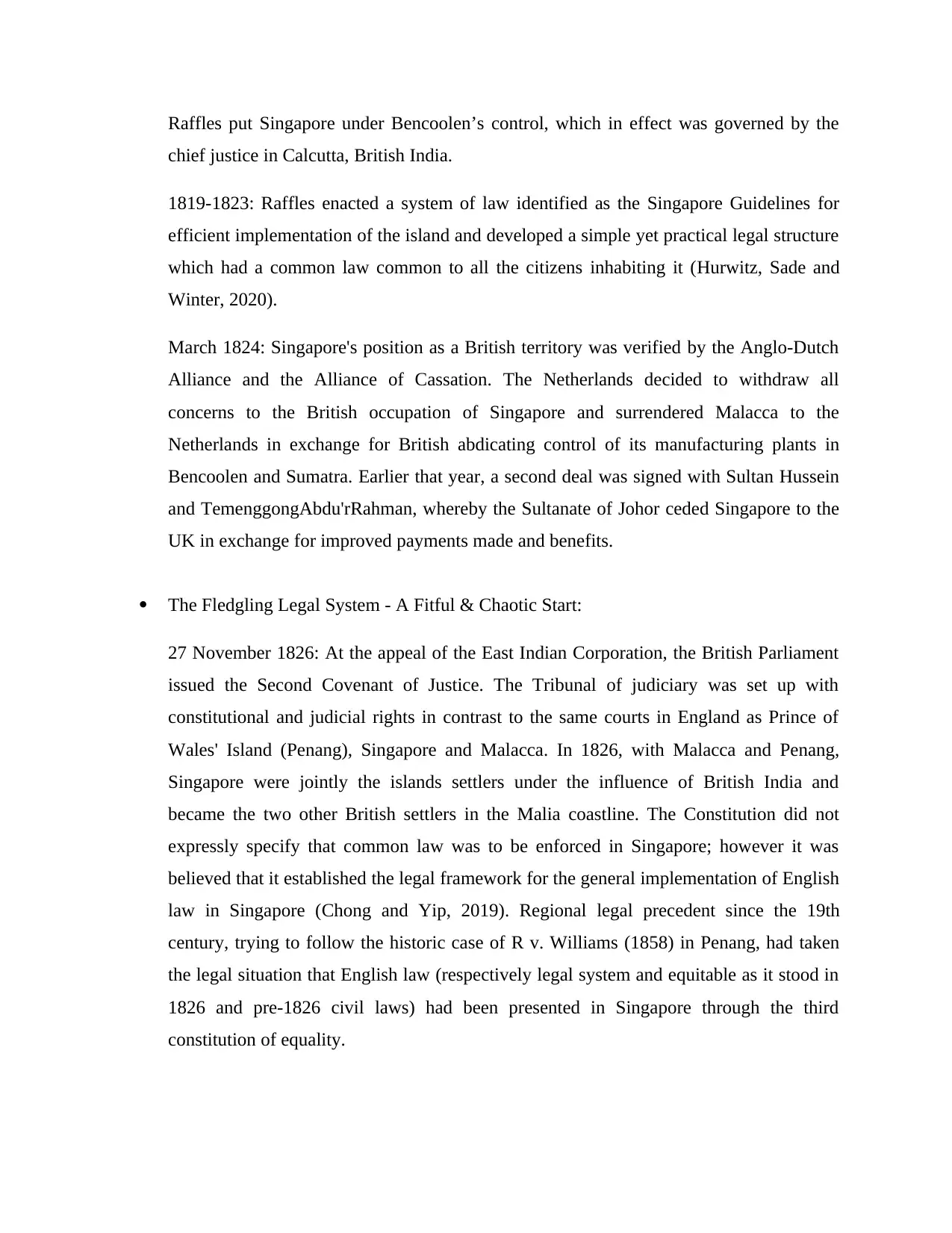
Raffles put Singapore under Bencoolen’s control, which in effect was governed by the
chief justice in Calcutta, British India.
1819-1823: Raffles enacted a system of law identified as the Singapore Guidelines for
efficient implementation of the island and developed a simple yet practical legal structure
which had a common law common to all the citizens inhabiting it (Hurwitz, Sade and
Winter, 2020).
March 1824: Singapore's position as a British territory was verified by the Anglo-Dutch
Alliance and the Alliance of Cassation. The Netherlands decided to withdraw all
concerns to the British occupation of Singapore and surrendered Malacca to the
Netherlands in exchange for British abdicating control of its manufacturing plants in
Bencoolen and Sumatra. Earlier that year, a second deal was signed with Sultan Hussein
and TemenggongAbdu'rRahman, whereby the Sultanate of Johor ceded Singapore to the
UK in exchange for improved payments made and benefits.
The Fledgling Legal System - A Fitful & Chaotic Start:
27 November 1826: At the appeal of the East Indian Corporation, the British Parliament
issued the Second Covenant of Justice. The Tribunal of judiciary was set up with
constitutional and judicial rights in contrast to the same courts in England as Prince of
Wales' Island (Penang), Singapore and Malacca. In 1826, with Malacca and Penang,
Singapore were jointly the islands settlers under the influence of British India and
became the two other British settlers in the Malia coastline. The Constitution did not
expressly specify that common law was to be enforced in Singapore; however it was
believed that it established the legal framework for the general implementation of English
law in Singapore (Chong and Yip, 2019). Regional legal precedent since the 19th
century, trying to follow the historic case of R v. Williams (1858) in Penang, had taken
the legal situation that English law (respectively legal system and equitable as it stood in
1826 and pre-1826 civil laws) had been presented in Singapore through the third
constitution of equality.
chief justice in Calcutta, British India.
1819-1823: Raffles enacted a system of law identified as the Singapore Guidelines for
efficient implementation of the island and developed a simple yet practical legal structure
which had a common law common to all the citizens inhabiting it (Hurwitz, Sade and
Winter, 2020).
March 1824: Singapore's position as a British territory was verified by the Anglo-Dutch
Alliance and the Alliance of Cassation. The Netherlands decided to withdraw all
concerns to the British occupation of Singapore and surrendered Malacca to the
Netherlands in exchange for British abdicating control of its manufacturing plants in
Bencoolen and Sumatra. Earlier that year, a second deal was signed with Sultan Hussein
and TemenggongAbdu'rRahman, whereby the Sultanate of Johor ceded Singapore to the
UK in exchange for improved payments made and benefits.
The Fledgling Legal System - A Fitful & Chaotic Start:
27 November 1826: At the appeal of the East Indian Corporation, the British Parliament
issued the Second Covenant of Justice. The Tribunal of judiciary was set up with
constitutional and judicial rights in contrast to the same courts in England as Prince of
Wales' Island (Penang), Singapore and Malacca. In 1826, with Malacca and Penang,
Singapore were jointly the islands settlers under the influence of British India and
became the two other British settlers in the Malia coastline. The Constitution did not
expressly specify that common law was to be enforced in Singapore; however it was
believed that it established the legal framework for the general implementation of English
law in Singapore (Chong and Yip, 2019). Regional legal precedent since the 19th
century, trying to follow the historic case of R v. Williams (1858) in Penang, had taken
the legal situation that English law (respectively legal system and equitable as it stood in
1826 and pre-1826 civil laws) had been presented in Singapore through the third
constitution of equality.
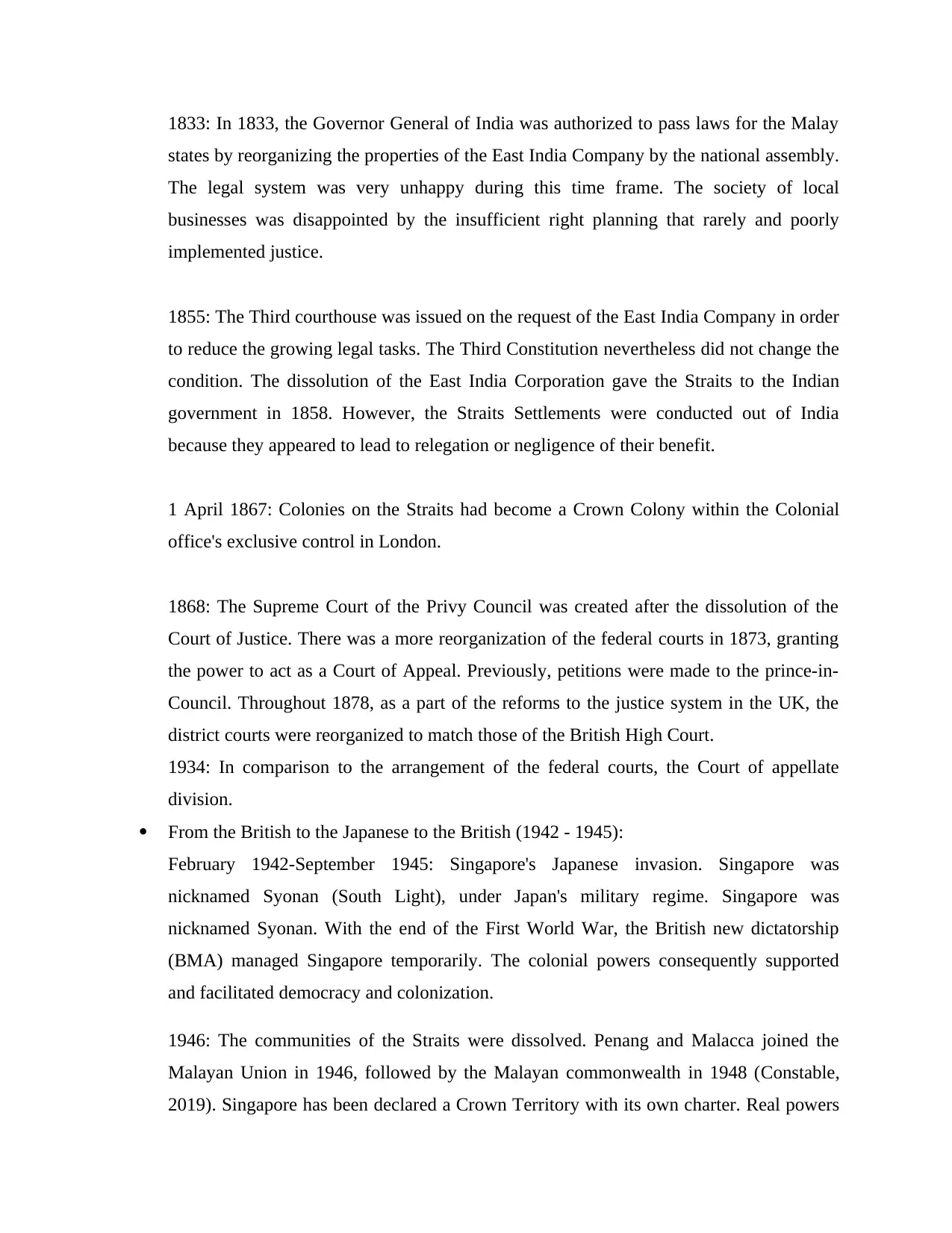
1833: In 1833, the Governor General of India was authorized to pass laws for the Malay
states by reorganizing the properties of the East India Company by the national assembly.
The legal system was very unhappy during this time frame. The society of local
businesses was disappointed by the insufficient right planning that rarely and poorly
implemented justice.
1855: The Third courthouse was issued on the request of the East India Company in order
to reduce the growing legal tasks. The Third Constitution nevertheless did not change the
condition. The dissolution of the East India Corporation gave the Straits to the Indian
government in 1858. However, the Straits Settlements were conducted out of India
because they appeared to lead to relegation or negligence of their benefit.
1 April 1867: Colonies on the Straits had become a Crown Colony within the Colonial
office's exclusive control in London.
1868: The Supreme Court of the Privy Council was created after the dissolution of the
Court of Justice. There was a more reorganization of the federal courts in 1873, granting
the power to act as a Court of Appeal. Previously, petitions were made to the prince-in-
Council. Throughout 1878, as a part of the reforms to the justice system in the UK, the
district courts were reorganized to match those of the British High Court.
1934: In comparison to the arrangement of the federal courts, the Court of appellate
division.
From the British to the Japanese to the British (1942 - 1945):
February 1942-September 1945: Singapore's Japanese invasion. Singapore was
nicknamed Syonan (South Light), under Japan's military regime. Singapore was
nicknamed Syonan. With the end of the First World War, the British new dictatorship
(BMA) managed Singapore temporarily. The colonial powers consequently supported
and facilitated democracy and colonization.
1946: The communities of the Straits were dissolved. Penang and Malacca joined the
Malayan Union in 1946, followed by the Malayan commonwealth in 1948 (Constable,
2019). Singapore has been declared a Crown Territory with its own charter. Real powers
states by reorganizing the properties of the East India Company by the national assembly.
The legal system was very unhappy during this time frame. The society of local
businesses was disappointed by the insufficient right planning that rarely and poorly
implemented justice.
1855: The Third courthouse was issued on the request of the East India Company in order
to reduce the growing legal tasks. The Third Constitution nevertheless did not change the
condition. The dissolution of the East India Corporation gave the Straits to the Indian
government in 1858. However, the Straits Settlements were conducted out of India
because they appeared to lead to relegation or negligence of their benefit.
1 April 1867: Colonies on the Straits had become a Crown Colony within the Colonial
office's exclusive control in London.
1868: The Supreme Court of the Privy Council was created after the dissolution of the
Court of Justice. There was a more reorganization of the federal courts in 1873, granting
the power to act as a Court of Appeal. Previously, petitions were made to the prince-in-
Council. Throughout 1878, as a part of the reforms to the justice system in the UK, the
district courts were reorganized to match those of the British High Court.
1934: In comparison to the arrangement of the federal courts, the Court of appellate
division.
From the British to the Japanese to the British (1942 - 1945):
February 1942-September 1945: Singapore's Japanese invasion. Singapore was
nicknamed Syonan (South Light), under Japan's military regime. Singapore was
nicknamed Syonan. With the end of the First World War, the British new dictatorship
(BMA) managed Singapore temporarily. The colonial powers consequently supported
and facilitated democracy and colonization.
1946: The communities of the Straits were dissolved. Penang and Malacca joined the
Malayan Union in 1946, followed by the Malayan commonwealth in 1948 (Constable,
2019). Singapore has been declared a Crown Territory with its own charter. Real powers
⊘ This is a preview!⊘
Do you want full access?
Subscribe today to unlock all pages.

Trusted by 1+ million students worldwide
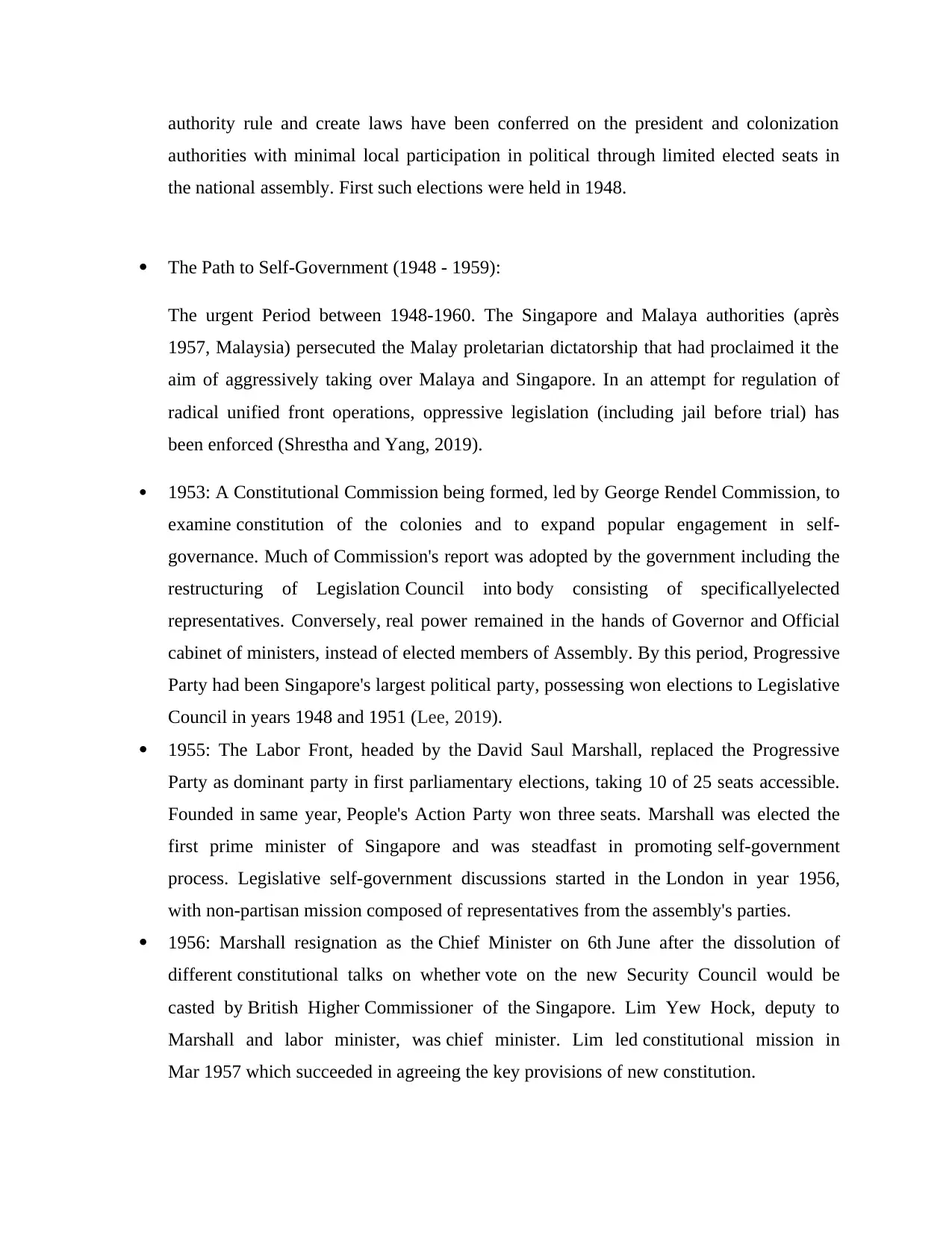
authority rule and create laws have been conferred on the president and colonization
authorities with minimal local participation in political through limited elected seats in
the national assembly. First such elections were held in 1948.
The Path to Self-Government (1948 - 1959):
The urgent Period between 1948-1960. The Singapore and Malaya authorities (après
1957, Malaysia) persecuted the Malay proletarian dictatorship that had proclaimed it the
aim of aggressively taking over Malaya and Singapore. In an attempt for regulation of
radical unified front operations, oppressive legislation (including jail before trial) has
been enforced (Shrestha and Yang, 2019).
1953: A Constitutional Commission being formed, led by George Rendel Commission, to
examine constitution of the colonies and to expand popular engagement in self-
governance. Much of Commission's report was adopted by the government including the
restructuring of Legislation Council into body consisting of specificallyelected
representatives. Conversely, real power remained in the hands of Governor and Official
cabinet of ministers, instead of elected members of Assembly. By this period, Progressive
Party had been Singapore's largest political party, possessing won elections to Legislative
Council in years 1948 and 1951 (Lee, 2019).
1955: The Labor Front, headed by the David Saul Marshall, replaced the Progressive
Party as dominant party in first parliamentary elections, taking 10 of 25 seats accessible.
Founded in same year, People's Action Party won three seats. Marshall was elected the
first prime minister of Singapore and was steadfast in promoting self-government
process. Legislative self-government discussions started in the London in year 1956,
with non-partisan mission composed of representatives from the assembly's parties.
1956: Marshall resignation as the Chief Minister on 6th June after the dissolution of
different constitutional talks on whether vote on the new Security Council would be
casted by British Higher Commissioner of the Singapore. Lim Yew Hock, deputy to
Marshall and labor minister, was chief minister. Lim led constitutional mission in
Mar 1957 which succeeded in agreeing the key provisions of new constitution.
authorities with minimal local participation in political through limited elected seats in
the national assembly. First such elections were held in 1948.
The Path to Self-Government (1948 - 1959):
The urgent Period between 1948-1960. The Singapore and Malaya authorities (après
1957, Malaysia) persecuted the Malay proletarian dictatorship that had proclaimed it the
aim of aggressively taking over Malaya and Singapore. In an attempt for regulation of
radical unified front operations, oppressive legislation (including jail before trial) has
been enforced (Shrestha and Yang, 2019).
1953: A Constitutional Commission being formed, led by George Rendel Commission, to
examine constitution of the colonies and to expand popular engagement in self-
governance. Much of Commission's report was adopted by the government including the
restructuring of Legislation Council into body consisting of specificallyelected
representatives. Conversely, real power remained in the hands of Governor and Official
cabinet of ministers, instead of elected members of Assembly. By this period, Progressive
Party had been Singapore's largest political party, possessing won elections to Legislative
Council in years 1948 and 1951 (Lee, 2019).
1955: The Labor Front, headed by the David Saul Marshall, replaced the Progressive
Party as dominant party in first parliamentary elections, taking 10 of 25 seats accessible.
Founded in same year, People's Action Party won three seats. Marshall was elected the
first prime minister of Singapore and was steadfast in promoting self-government
process. Legislative self-government discussions started in the London in year 1956,
with non-partisan mission composed of representatives from the assembly's parties.
1956: Marshall resignation as the Chief Minister on 6th June after the dissolution of
different constitutional talks on whether vote on the new Security Council would be
casted by British Higher Commissioner of the Singapore. Lim Yew Hock, deputy to
Marshall and labor minister, was chief minister. Lim led constitutional mission in
Mar 1957 which succeeded in agreeing the key provisions of new constitution.
Paraphrase This Document
Need a fresh take? Get an instant paraphrase of this document with our AI Paraphraser
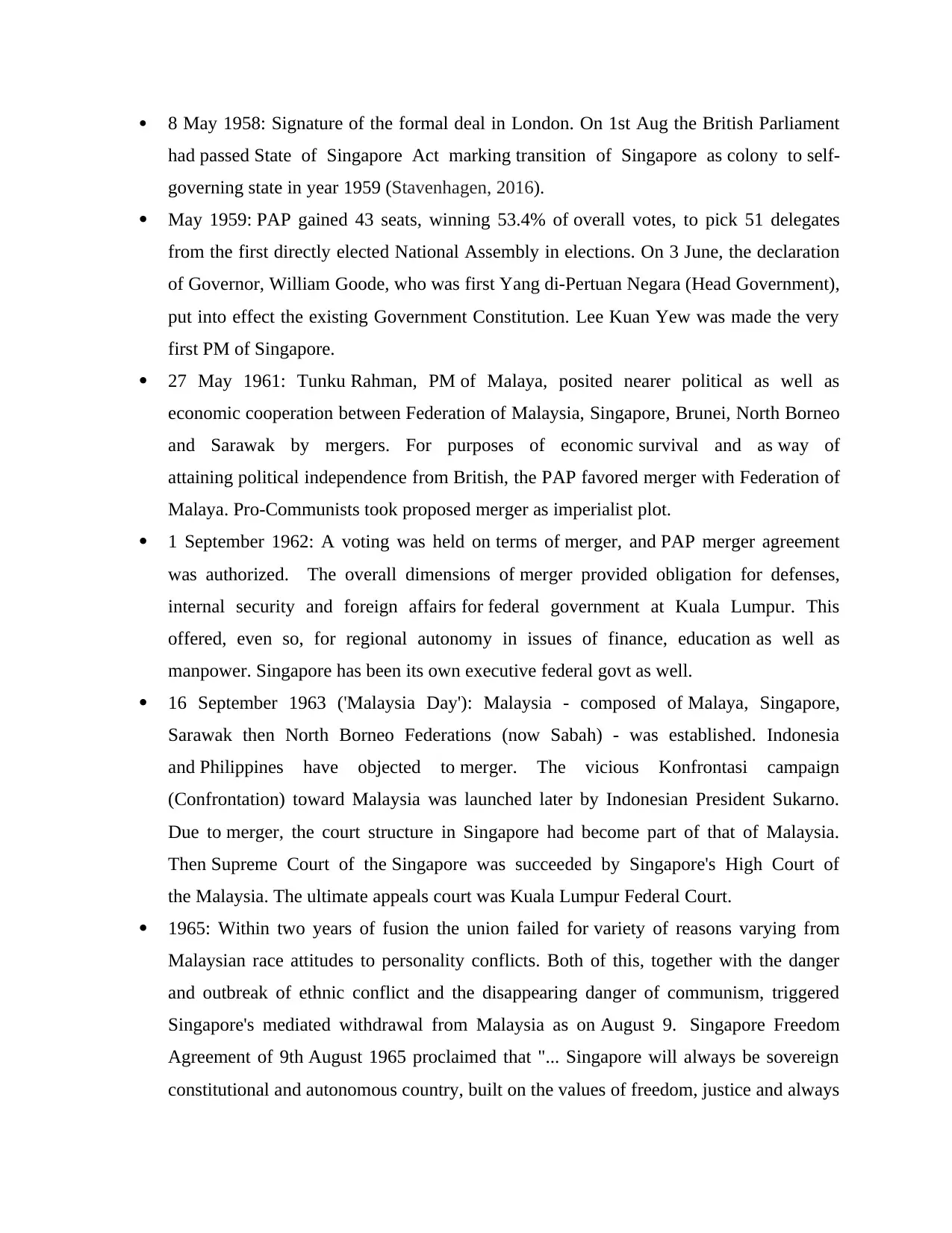
8 May 1958: Signature of the formal deal in London. On 1st Aug the British Parliament
had passed State of Singapore Act marking transition of Singapore as colony to self-
governing state in year 1959 (Stavenhagen, 2016).
May 1959: PAP gained 43 seats, winning 53.4% of overall votes, to pick 51 delegates
from the first directly elected National Assembly in elections. On 3 June, the declaration
of Governor, William Goode, who was first Yang di-Pertuan Negara (Head Government),
put into effect the existing Government Constitution. Lee Kuan Yew was made the very
first PM of Singapore.
27 May 1961: Tunku Rahman, PM of Malaya, posited nearer political as well as
economic cooperation between Federation of Malaysia, Singapore, Brunei, North Borneo
and Sarawak by mergers. For purposes of economic survival and as way of
attaining political independence from British, the PAP favored merger with Federation of
Malaya. Pro-Communists took proposed merger as imperialist plot.
1 September 1962: A voting was held on terms of merger, and PAP merger agreement
was authorized. The overall dimensions of merger provided obligation for defenses,
internal security and foreign affairs for federal government at Kuala Lumpur. This
offered, even so, for regional autonomy in issues of finance, education as well as
manpower. Singapore has been its own executive federal govt as well.
16 September 1963 ('Malaysia Day'): Malaysia - composed of Malaya, Singapore,
Sarawak then North Borneo Federations (now Sabah) - was established. Indonesia
and Philippines have objected to merger. The vicious Konfrontasi campaign
(Confrontation) toward Malaysia was launched later by Indonesian President Sukarno.
Due to merger, the court structure in Singapore had become part of that of Malaysia.
Then Supreme Court of the Singapore was succeeded by Singapore's High Court of
the Malaysia. The ultimate appeals court was Kuala Lumpur Federal Court.
1965: Within two years of fusion the union failed for variety of reasons varying from
Malaysian race attitudes to personality conflicts. Both of this, together with the danger
and outbreak of ethnic conflict and the disappearing danger of communism, triggered
Singapore's mediated withdrawal from Malaysia as on August 9. Singapore Freedom
Agreement of 9th August 1965 proclaimed that "... Singapore will always be sovereign
constitutional and autonomous country, built on the values of freedom, justice and always
had passed State of Singapore Act marking transition of Singapore as colony to self-
governing state in year 1959 (Stavenhagen, 2016).
May 1959: PAP gained 43 seats, winning 53.4% of overall votes, to pick 51 delegates
from the first directly elected National Assembly in elections. On 3 June, the declaration
of Governor, William Goode, who was first Yang di-Pertuan Negara (Head Government),
put into effect the existing Government Constitution. Lee Kuan Yew was made the very
first PM of Singapore.
27 May 1961: Tunku Rahman, PM of Malaya, posited nearer political as well as
economic cooperation between Federation of Malaysia, Singapore, Brunei, North Borneo
and Sarawak by mergers. For purposes of economic survival and as way of
attaining political independence from British, the PAP favored merger with Federation of
Malaya. Pro-Communists took proposed merger as imperialist plot.
1 September 1962: A voting was held on terms of merger, and PAP merger agreement
was authorized. The overall dimensions of merger provided obligation for defenses,
internal security and foreign affairs for federal government at Kuala Lumpur. This
offered, even so, for regional autonomy in issues of finance, education as well as
manpower. Singapore has been its own executive federal govt as well.
16 September 1963 ('Malaysia Day'): Malaysia - composed of Malaya, Singapore,
Sarawak then North Borneo Federations (now Sabah) - was established. Indonesia
and Philippines have objected to merger. The vicious Konfrontasi campaign
(Confrontation) toward Malaysia was launched later by Indonesian President Sukarno.
Due to merger, the court structure in Singapore had become part of that of Malaysia.
Then Supreme Court of the Singapore was succeeded by Singapore's High Court of
the Malaysia. The ultimate appeals court was Kuala Lumpur Federal Court.
1965: Within two years of fusion the union failed for variety of reasons varying from
Malaysian race attitudes to personality conflicts. Both of this, together with the danger
and outbreak of ethnic conflict and the disappearing danger of communism, triggered
Singapore's mediated withdrawal from Malaysia as on August 9. Singapore Freedom
Agreement of 9th August 1965 proclaimed that "... Singapore will always be sovereign
constitutional and autonomous country, built on the values of freedom, justice and always
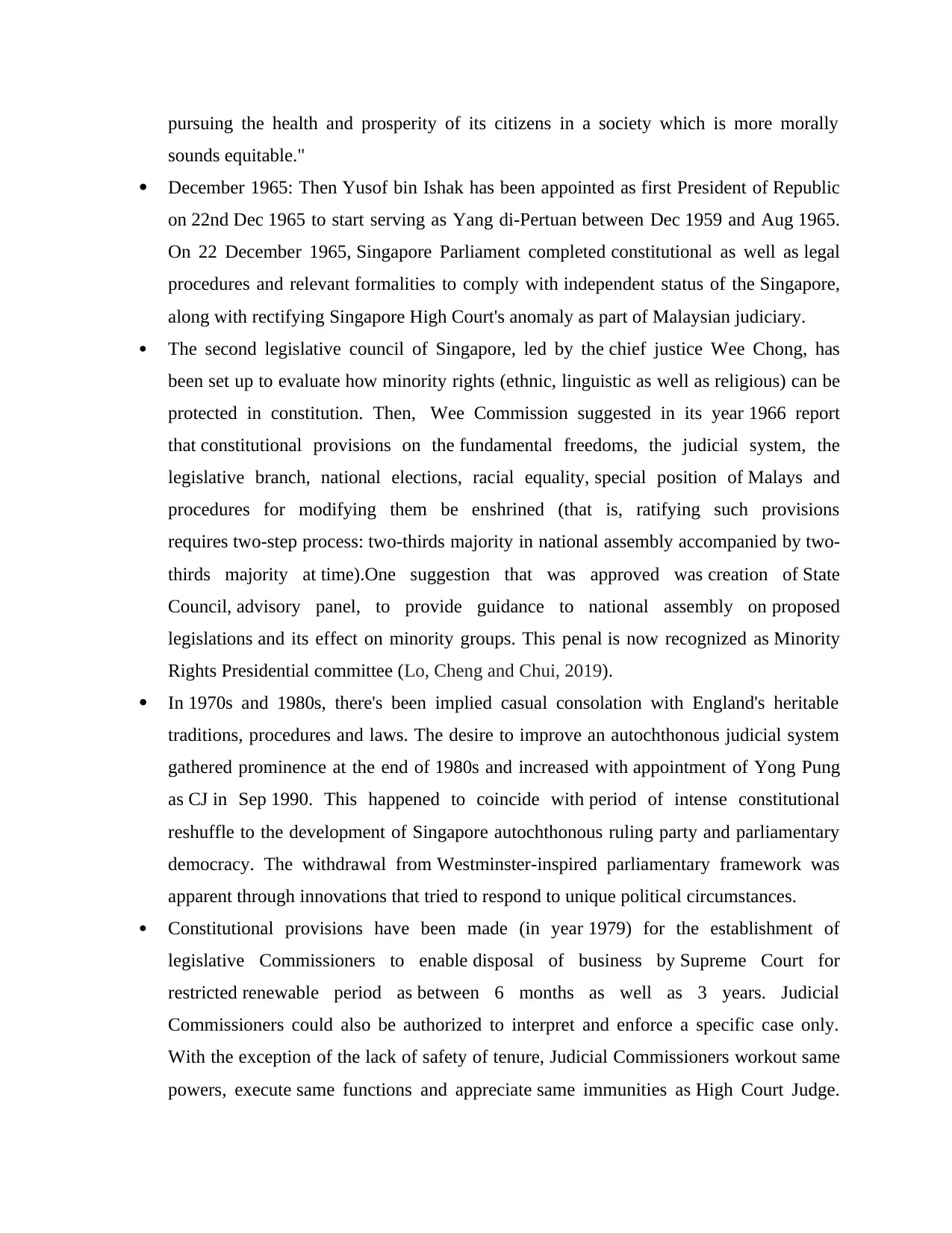
pursuing the health and prosperity of its citizens in a society which is more morally
sounds equitable."
December 1965: Then Yusof bin Ishak has been appointed as first President of Republic
on 22nd Dec 1965 to start serving as Yang di-Pertuan between Dec 1959 and Aug 1965.
On 22 December 1965, Singapore Parliament completed constitutional as well as legal
procedures and relevant formalities to comply with independent status of the Singapore,
along with rectifying Singapore High Court's anomaly as part of Malaysian judiciary.
The second legislative council of Singapore, led by the chief justice Wee Chong, has
been set up to evaluate how minority rights (ethnic, linguistic as well as religious) can be
protected in constitution. Then, Wee Commission suggested in its year 1966 report
that constitutional provisions on the fundamental freedoms, the judicial system, the
legislative branch, national elections, racial equality, special position of Malays and
procedures for modifying them be enshrined (that is, ratifying such provisions
requires two-step process: two-thirds majority in national assembly accompanied by two-
thirds majority at time).One suggestion that was approved was creation of State
Council, advisory panel, to provide guidance to national assembly on proposed
legislations and its effect on minority groups. This penal is now recognized as Minority
Rights Presidential committee (Lo, Cheng and Chui, 2019).
In 1970s and 1980s, there's been implied casual consolation with England's heritable
traditions, procedures and laws. The desire to improve an autochthonous judicial system
gathered prominence at the end of 1980s and increased with appointment of Yong Pung
as CJ in Sep 1990. This happened to coincide with period of intense constitutional
reshuffle to the development of Singapore autochthonous ruling party and parliamentary
democracy. The withdrawal from Westminster-inspired parliamentary framework was
apparent through innovations that tried to respond to unique political circumstances.
Constitutional provisions have been made (in year 1979) for the establishment of
legislative Commissioners to enable disposal of business by Supreme Court for
restricted renewable period as between 6 months as well as 3 years. Judicial
Commissioners could also be authorized to interpret and enforce a specific case only.
With the exception of the lack of safety of tenure, Judicial Commissioners workout same
powers, execute same functions and appreciate same immunities as High Court Judge.
sounds equitable."
December 1965: Then Yusof bin Ishak has been appointed as first President of Republic
on 22nd Dec 1965 to start serving as Yang di-Pertuan between Dec 1959 and Aug 1965.
On 22 December 1965, Singapore Parliament completed constitutional as well as legal
procedures and relevant formalities to comply with independent status of the Singapore,
along with rectifying Singapore High Court's anomaly as part of Malaysian judiciary.
The second legislative council of Singapore, led by the chief justice Wee Chong, has
been set up to evaluate how minority rights (ethnic, linguistic as well as religious) can be
protected in constitution. Then, Wee Commission suggested in its year 1966 report
that constitutional provisions on the fundamental freedoms, the judicial system, the
legislative branch, national elections, racial equality, special position of Malays and
procedures for modifying them be enshrined (that is, ratifying such provisions
requires two-step process: two-thirds majority in national assembly accompanied by two-
thirds majority at time).One suggestion that was approved was creation of State
Council, advisory panel, to provide guidance to national assembly on proposed
legislations and its effect on minority groups. This penal is now recognized as Minority
Rights Presidential committee (Lo, Cheng and Chui, 2019).
In 1970s and 1980s, there's been implied casual consolation with England's heritable
traditions, procedures and laws. The desire to improve an autochthonous judicial system
gathered prominence at the end of 1980s and increased with appointment of Yong Pung
as CJ in Sep 1990. This happened to coincide with period of intense constitutional
reshuffle to the development of Singapore autochthonous ruling party and parliamentary
democracy. The withdrawal from Westminster-inspired parliamentary framework was
apparent through innovations that tried to respond to unique political circumstances.
Constitutional provisions have been made (in year 1979) for the establishment of
legislative Commissioners to enable disposal of business by Supreme Court for
restricted renewable period as between 6 months as well as 3 years. Judicial
Commissioners could also be authorized to interpret and enforce a specific case only.
With the exception of the lack of safety of tenure, Judicial Commissioners workout same
powers, execute same functions and appreciate same immunities as High Court Judge.
⊘ This is a preview!⊘
Do you want full access?
Subscribe today to unlock all pages.

Trusted by 1+ million students worldwide
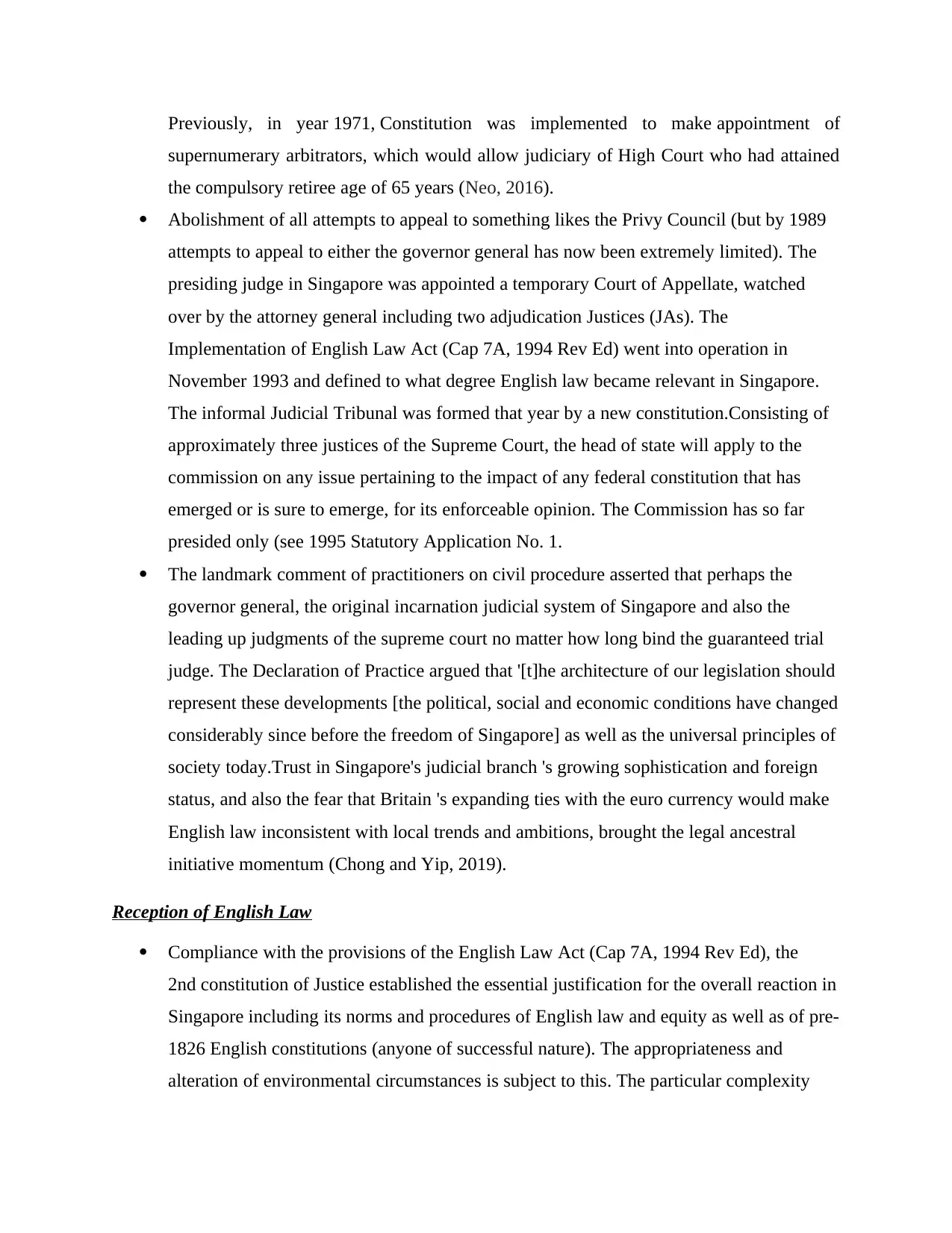
Previously, in year 1971, Constitution was implemented to make appointment of
supernumerary arbitrators, which would allow judiciary of High Court who had attained
the compulsory retiree age of 65 years (Neo, 2016).
Abolishment of all attempts to appeal to something likes the Privy Council (but by 1989
attempts to appeal to either the governor general has now been extremely limited). The
presiding judge in Singapore was appointed a temporary Court of Appellate, watched
over by the attorney general including two adjudication Justices (JAs). The
Implementation of English Law Act (Cap 7A, 1994 Rev Ed) went into operation in
November 1993 and defined to what degree English law became relevant in Singapore.
The informal Judicial Tribunal was formed that year by a new constitution.Consisting of
approximately three justices of the Supreme Court, the head of state will apply to the
commission on any issue pertaining to the impact of any federal constitution that has
emerged or is sure to emerge, for its enforceable opinion. The Commission has so far
presided only (see 1995 Statutory Application No. 1.
The landmark comment of practitioners on civil procedure asserted that perhaps the
governor general, the original incarnation judicial system of Singapore and also the
leading up judgments of the supreme court no matter how long bind the guaranteed trial
judge. The Declaration of Practice argued that '[t]he architecture of our legislation should
represent these developments [the political, social and economic conditions have changed
considerably since before the freedom of Singapore] as well as the universal principles of
society today.Trust in Singapore's judicial branch 's growing sophistication and foreign
status, and also the fear that Britain 's expanding ties with the euro currency would make
English law inconsistent with local trends and ambitions, brought the legal ancestral
initiative momentum (Chong and Yip, 2019).
Reception of English Law
Compliance with the provisions of the English Law Act (Cap 7A, 1994 Rev Ed), the
2nd constitution of Justice established the essential justification for the overall reaction in
Singapore including its norms and procedures of English law and equity as well as of pre-
1826 English constitutions (anyone of successful nature). The appropriateness and
alteration of environmental circumstances is subject to this. The particular complexity
supernumerary arbitrators, which would allow judiciary of High Court who had attained
the compulsory retiree age of 65 years (Neo, 2016).
Abolishment of all attempts to appeal to something likes the Privy Council (but by 1989
attempts to appeal to either the governor general has now been extremely limited). The
presiding judge in Singapore was appointed a temporary Court of Appellate, watched
over by the attorney general including two adjudication Justices (JAs). The
Implementation of English Law Act (Cap 7A, 1994 Rev Ed) went into operation in
November 1993 and defined to what degree English law became relevant in Singapore.
The informal Judicial Tribunal was formed that year by a new constitution.Consisting of
approximately three justices of the Supreme Court, the head of state will apply to the
commission on any issue pertaining to the impact of any federal constitution that has
emerged or is sure to emerge, for its enforceable opinion. The Commission has so far
presided only (see 1995 Statutory Application No. 1.
The landmark comment of practitioners on civil procedure asserted that perhaps the
governor general, the original incarnation judicial system of Singapore and also the
leading up judgments of the supreme court no matter how long bind the guaranteed trial
judge. The Declaration of Practice argued that '[t]he architecture of our legislation should
represent these developments [the political, social and economic conditions have changed
considerably since before the freedom of Singapore] as well as the universal principles of
society today.Trust in Singapore's judicial branch 's growing sophistication and foreign
status, and also the fear that Britain 's expanding ties with the euro currency would make
English law inconsistent with local trends and ambitions, brought the legal ancestral
initiative momentum (Chong and Yip, 2019).
Reception of English Law
Compliance with the provisions of the English Law Act (Cap 7A, 1994 Rev Ed), the
2nd constitution of Justice established the essential justification for the overall reaction in
Singapore including its norms and procedures of English law and equity as well as of pre-
1826 English constitutions (anyone of successful nature). The appropriateness and
alteration of environmental circumstances is subject to this. The particular complexity
Paraphrase This Document
Need a fresh take? Get an instant paraphrase of this document with our AI Paraphraser
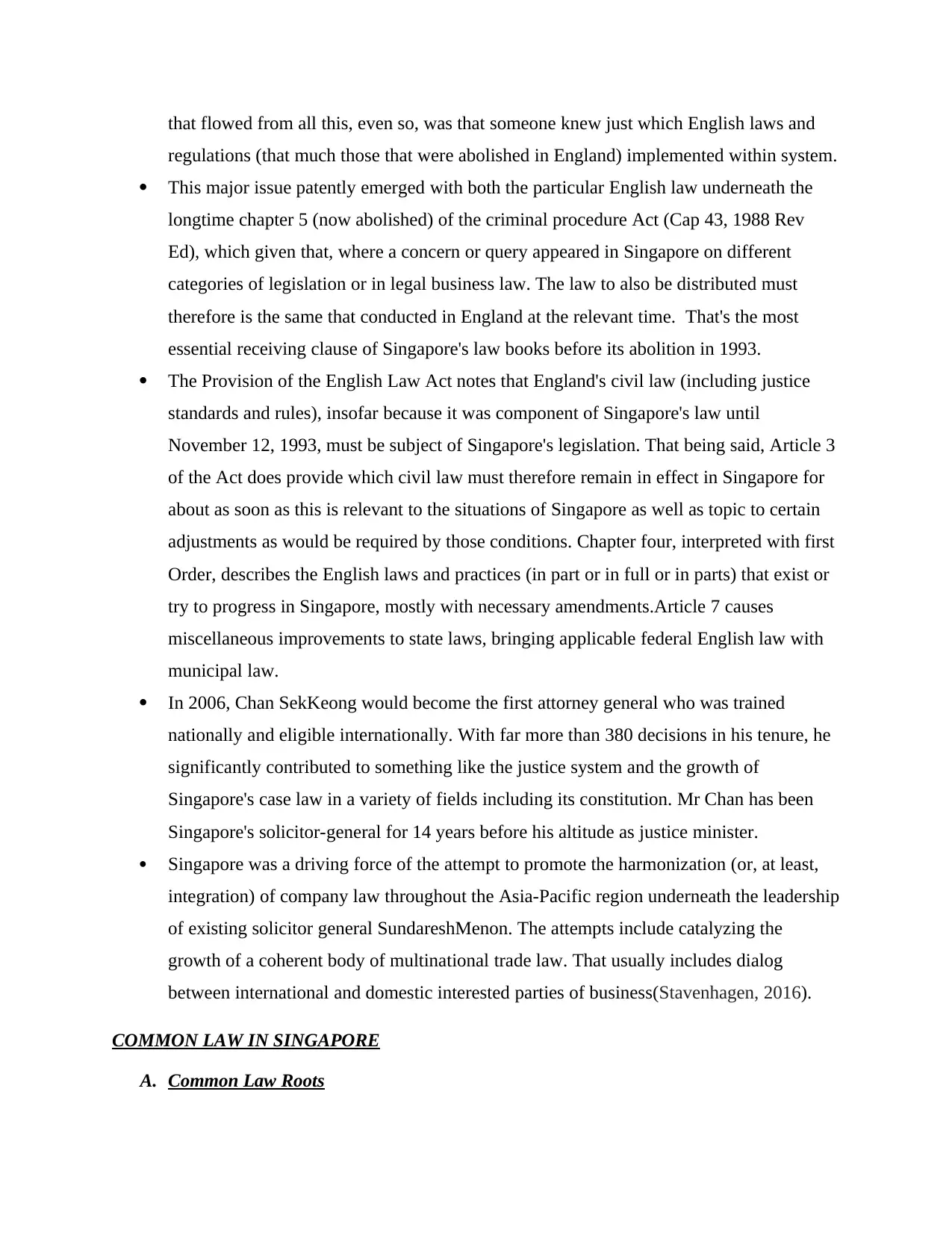
that flowed from all this, even so, was that someone knew just which English laws and
regulations (that much those that were abolished in England) implemented within system.
This major issue patently emerged with both the particular English law underneath the
longtime chapter 5 (now abolished) of the criminal procedure Act (Cap 43, 1988 Rev
Ed), which given that, where a concern or query appeared in Singapore on different
categories of legislation or in legal business law. The law to also be distributed must
therefore is the same that conducted in England at the relevant time. That's the most
essential receiving clause of Singapore's law books before its abolition in 1993.
The Provision of the English Law Act notes that England's civil law (including justice
standards and rules), insofar because it was component of Singapore's law until
November 12, 1993, must be subject of Singapore's legislation. That being said, Article 3
of the Act does provide which civil law must therefore remain in effect in Singapore for
about as soon as this is relevant to the situations of Singapore as well as topic to certain
adjustments as would be required by those conditions. Chapter four, interpreted with first
Order, describes the English laws and practices (in part or in full or in parts) that exist or
try to progress in Singapore, mostly with necessary amendments.Article 7 causes
miscellaneous improvements to state laws, bringing applicable federal English law with
municipal law.
In 2006, Chan SekKeong would become the first attorney general who was trained
nationally and eligible internationally. With far more than 380 decisions in his tenure, he
significantly contributed to something like the justice system and the growth of
Singapore's case law in a variety of fields including its constitution. Mr Chan has been
Singapore's solicitor-general for 14 years before his altitude as justice minister.
Singapore was a driving force of the attempt to promote the harmonization (or, at least,
integration) of company law throughout the Asia-Pacific region underneath the leadership
of existing solicitor general SundareshMenon. The attempts include catalyzing the
growth of a coherent body of multinational trade law. That usually includes dialog
between international and domestic interested parties of business(Stavenhagen, 2016).
COMMON LAW IN SINGAPORE
A. Common Law Roots
regulations (that much those that were abolished in England) implemented within system.
This major issue patently emerged with both the particular English law underneath the
longtime chapter 5 (now abolished) of the criminal procedure Act (Cap 43, 1988 Rev
Ed), which given that, where a concern or query appeared in Singapore on different
categories of legislation or in legal business law. The law to also be distributed must
therefore is the same that conducted in England at the relevant time. That's the most
essential receiving clause of Singapore's law books before its abolition in 1993.
The Provision of the English Law Act notes that England's civil law (including justice
standards and rules), insofar because it was component of Singapore's law until
November 12, 1993, must be subject of Singapore's legislation. That being said, Article 3
of the Act does provide which civil law must therefore remain in effect in Singapore for
about as soon as this is relevant to the situations of Singapore as well as topic to certain
adjustments as would be required by those conditions. Chapter four, interpreted with first
Order, describes the English laws and practices (in part or in full or in parts) that exist or
try to progress in Singapore, mostly with necessary amendments.Article 7 causes
miscellaneous improvements to state laws, bringing applicable federal English law with
municipal law.
In 2006, Chan SekKeong would become the first attorney general who was trained
nationally and eligible internationally. With far more than 380 decisions in his tenure, he
significantly contributed to something like the justice system and the growth of
Singapore's case law in a variety of fields including its constitution. Mr Chan has been
Singapore's solicitor-general for 14 years before his altitude as justice minister.
Singapore was a driving force of the attempt to promote the harmonization (or, at least,
integration) of company law throughout the Asia-Pacific region underneath the leadership
of existing solicitor general SundareshMenon. The attempts include catalyzing the
growth of a coherent body of multinational trade law. That usually includes dialog
between international and domestic interested parties of business(Stavenhagen, 2016).
COMMON LAW IN SINGAPORE
A. Common Law Roots
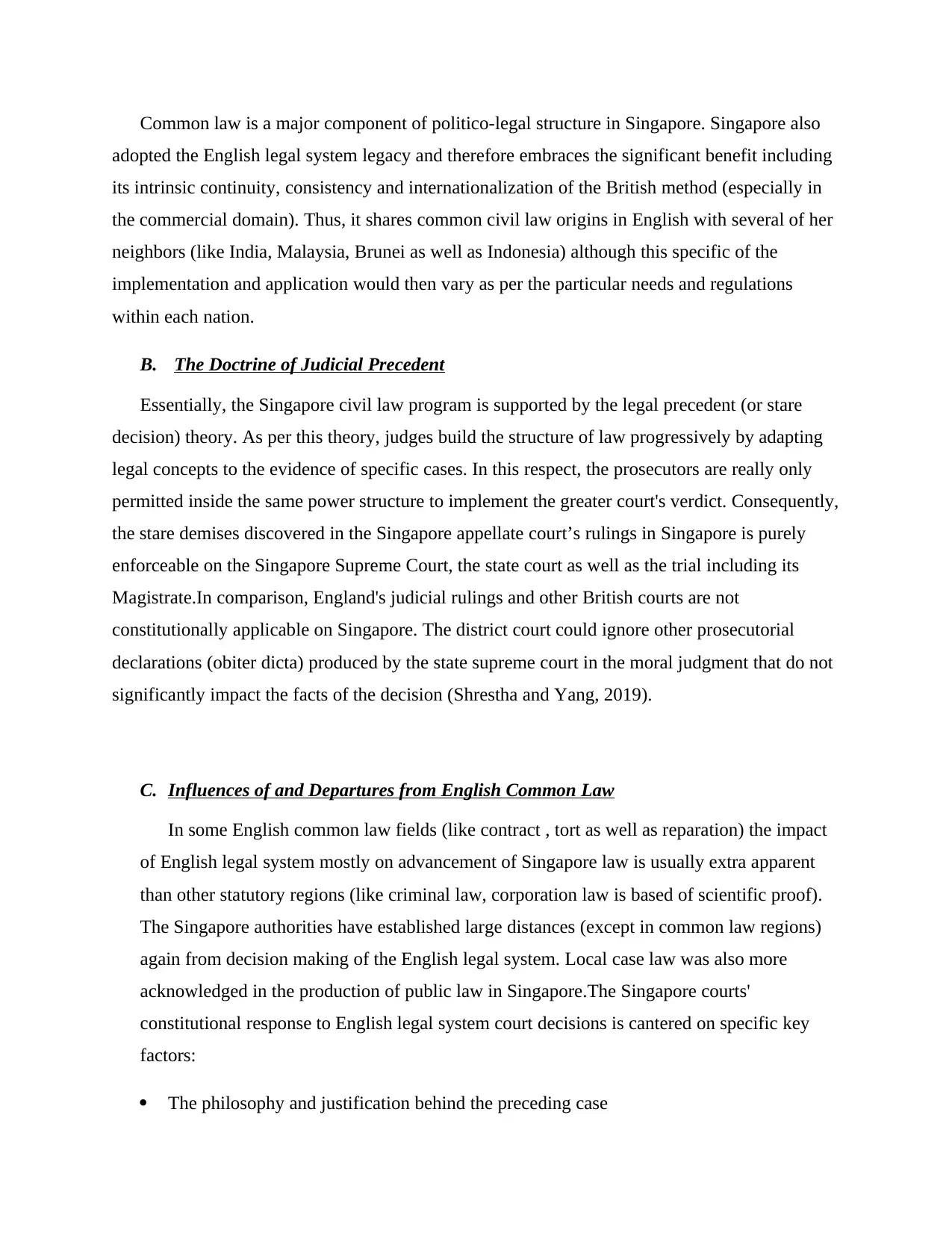
Common law is a major component of politico-legal structure in Singapore. Singapore also
adopted the English legal system legacy and therefore embraces the significant benefit including
its intrinsic continuity, consistency and internationalization of the British method (especially in
the commercial domain). Thus, it shares common civil law origins in English with several of her
neighbors (like India, Malaysia, Brunei as well as Indonesia) although this specific of the
implementation and application would then vary as per the particular needs and regulations
within each nation.
B. The Doctrine of Judicial Precedent
Essentially, the Singapore civil law program is supported by the legal precedent (or stare
decision) theory. As per this theory, judges build the structure of law progressively by adapting
legal concepts to the evidence of specific cases. In this respect, the prosecutors are really only
permitted inside the same power structure to implement the greater court's verdict. Consequently,
the stare demises discovered in the Singapore appellate court’s rulings in Singapore is purely
enforceable on the Singapore Supreme Court, the state court as well as the trial including its
Magistrate.In comparison, England's judicial rulings and other British courts are not
constitutionally applicable on Singapore. The district court could ignore other prosecutorial
declarations (obiter dicta) produced by the state supreme court in the moral judgment that do not
significantly impact the facts of the decision (Shrestha and Yang, 2019).
C. Influences of and Departures from English Common Law
In some English common law fields (like contract , tort as well as reparation) the impact
of English legal system mostly on advancement of Singapore law is usually extra apparent
than other statutory regions (like criminal law, corporation law is based of scientific proof).
The Singapore authorities have established large distances (except in common law regions)
again from decision making of the English legal system. Local case law was also more
acknowledged in the production of public law in Singapore.The Singapore courts'
constitutional response to English legal system court decisions is cantered on specific key
factors:
The philosophy and justification behind the preceding case
adopted the English legal system legacy and therefore embraces the significant benefit including
its intrinsic continuity, consistency and internationalization of the British method (especially in
the commercial domain). Thus, it shares common civil law origins in English with several of her
neighbors (like India, Malaysia, Brunei as well as Indonesia) although this specific of the
implementation and application would then vary as per the particular needs and regulations
within each nation.
B. The Doctrine of Judicial Precedent
Essentially, the Singapore civil law program is supported by the legal precedent (or stare
decision) theory. As per this theory, judges build the structure of law progressively by adapting
legal concepts to the evidence of specific cases. In this respect, the prosecutors are really only
permitted inside the same power structure to implement the greater court's verdict. Consequently,
the stare demises discovered in the Singapore appellate court’s rulings in Singapore is purely
enforceable on the Singapore Supreme Court, the state court as well as the trial including its
Magistrate.In comparison, England's judicial rulings and other British courts are not
constitutionally applicable on Singapore. The district court could ignore other prosecutorial
declarations (obiter dicta) produced by the state supreme court in the moral judgment that do not
significantly impact the facts of the decision (Shrestha and Yang, 2019).
C. Influences of and Departures from English Common Law
In some English common law fields (like contract , tort as well as reparation) the impact
of English legal system mostly on advancement of Singapore law is usually extra apparent
than other statutory regions (like criminal law, corporation law is based of scientific proof).
The Singapore authorities have established large distances (except in common law regions)
again from decision making of the English legal system. Local case law was also more
acknowledged in the production of public law in Singapore.The Singapore courts'
constitutional response to English legal system court decisions is cantered on specific key
factors:
The philosophy and justification behind the preceding case
⊘ This is a preview!⊘
Do you want full access?
Subscribe today to unlock all pages.

Trusted by 1+ million students worldwide
1 out of 15
Related Documents
Your All-in-One AI-Powered Toolkit for Academic Success.
+13062052269
info@desklib.com
Available 24*7 on WhatsApp / Email
![[object Object]](/_next/static/media/star-bottom.7253800d.svg)
Unlock your academic potential
Copyright © 2020–2026 A2Z Services. All Rights Reserved. Developed and managed by ZUCOL.





